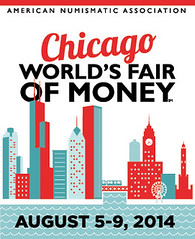
About UsThe Numismatic Bibliomania Society is a non-profit organization promoting numismatic literature. For more information please see our web site at coinbooks.org SubscriptionsThose wishing to become new E-Sylum subscribers (or wishing to Unsubscribe) can go to the following web page link MembershipThere is a membership application available on the web site Membership Application To join, print the application and return it with your check to the address printed on the application. Membership is only $20 to addresses in the U.S., $25 for First Class mail, and $30 elsewhere. For those without web access, write to: David M. Sundman, Treasurer AsylumFor Asylum mailing address changes and other membership questions, contact David at this email address: dsundman@LittletonCoin.com SubmissionsTo submit items for publication in The E-Sylum, just Reply to this message, or write to the Editor at this address: whomren@gmail.com
BUY THE BOOK BEFORE THE COIN |
- WAYNE'S WORDS: THE E-SYLUM JUNE 8, 2014
- ASYLUM JANUARY-MARCH 2014 ISSUE PUBLISHED
- NBS EVENTS AT THE 2014 CHICAGO ANA
- NEW BOOK: BRITISH AND IRISH COPPER TOKENS OF 1787 – 1804
- BETTER PRICES FOR NUMISMATIC BOOKS FROM INDIA
- JOHN H. BURNS LAID TO REST
- NOTES FROM E-SYLUM READERS: JUNE 8, 2014
- COURT CALLS FOR EXPERT TO SUPERVISE SS CENTRAL AMERICA ARTIFACTS
- SS CENTRAL AMERICA LAWYER FINED FOR LYING TO COURT
- MORE ON HOBO NICKELS AND ETHNIC SLURS
- MORE ON THE '1915' HUDSON BAY COMPANY TOKEN
- BILL NOYES ON CONDER TOKENS AND CONDER TOKENS
- COLLECTING COUNTERSTAMPS BY DENOMINATION
- DENMARK COIN POSTCARDS
- 2014 MINT DIRECTORS CONFERENCE REPORT
- DOMINICAN REPUBLIC SAMANA BAY FRUIT CO. NOTE
- 1919 RUSSIA 50 KOPEKS SHIMADA NOTE
- ARABIAN AMERICAN COMPANY 10 POINTS NOTE
- ROMAN COIN MOULDS IN ARCHAEOLOGICAL LITERATURE
- ELEPHANTS ON ANCIENT COINS
- LIAM O'CONNOR'S CHAIN LINK MEDALS
- CLAD COIN CAMEO CARVINGS
- ROYAL MINT ISSUES FIRST WORLD WAR OUTBREAK COINS
- ROYAL MINT ISSUES: EXPLORATION AND HAUNTED CANADA
- MORE ON THE EMPEROR NORTON BRIDGE CAMPAIGN
- HARVARD BOOK BOUND IN HUMAN SKIN
- PROFOUND MONEY JOKES
- FEATURED WEB PAGE: FREIE STADT DANZIG COINS
Click here to access the complete archive
To comment or submit articles, reply to whomren@gmail.com
WAYNE'S WORDS: THE E-SYLUM JUNE 8, 2014

First, some corrections to the last issue. John Kraljevich's ad should have linked to this page: http://www.jkamericana.com/dupre/ .
And while I got Joe Levine's new ad right, I had a typo in the headline of the article on his upcoming sale; the closing date is June 30, 2014. Also, to view the catalog, see: Presidential June 30, 2014 Catalog . Thanks to Bob Merchant for catching these.
Our new subscribers this week include Mark Irwin and Scott Hopkins. Welcome aboard! We have 1,732 email subscribers.
This week we open with the contents of the January-March 2014 issue of The Asylum, NBS events at the Chicago ANA, a new book on British and Irish tokens, and where to find cheaper prices on numismatic books from India.
Other topics include Conder tokens, the 2014 Mint Directors conference, Roman coin moulds, elephants on ancient coins, new issues from the Royal Mint and Royal Canadian Mint, and cameo coin carvings.
To learn more about the Jew nickel, "Real Tokens", counterstamped type coins, Casa de Moneda, the Ghost Bride, anthropodermic bibliopegy and The Largest Meatball in the World, read on. Have a great week, everyone!
Wayne Homren
Editor, The E-Sylum
ASYLUM JANUARY-MARCH 2014 ISSUE PUBLISHED
-
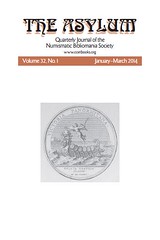 John W. Adams - The Curious Case of William Hesslein
John W. Adams - The Curious Case of William Hesslein
- Joe Foster - Some Observations on Sale One of the W. W. C. Wilson Collection
- Scott Douglas - Numismatically Canadian: William Robert McColl (1855-1933)
- Leonard Augsburger - Who Said It? A Test of Numismatic Identity
- John Kraljevich - In Memory of a Mensch: John H. Burns George Kolbe - Reminiscences of a Numismatic Bookseller 4
- David F. Fanning - Off the Shelf
For a membership form, see: www.coinbooks.org/about/NBS_Membership_Form_2014.pdf
NBS EVENTS AT THE 2014 CHICAGO ANA
Numismatic Bibliomania Society's Symposium
11:30 a.m.-1 p.m.
Room 42
Donald E. Stephens Convention Center
Numismatic Bibliomania Society Board Meeting
1-2:30 p.m.
Room 43
Donald E. Stephens Convention Center
Friday, Aug. 8
Numismatic Bibliomania Society General Meeting
11:30 a.m.-1 p.m.
Room 42
Donald E. Stephens Convention Center
For more information, see:
Get ready for the 2014 World's Fair of Money
(http://worldsfairofmoney.com/)
Schedule
(http://worldsfairofmoney.com/schedule.aspx)
TOKEN, MEDAL AND POLITICAL AUCTION
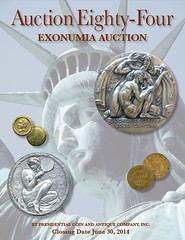
Presidential Coin & Antique Co., Inc.'s Auction Eighty-Four of Tokens, Medals and Political items closes June 30, 2014. Hardcopies $6 - contact Joe Levine at Jlevine968@aol.com or view the catalog online here .
Hard Times Tokens, 19th Century Storecard Tokens, Civil War Tokens, Military & Related, So-Called Dollars, Presidential & Political, World's Fairs & Expositions, U.S. Mint Medals, ANS Medals, Foreign Tokens and Medals, and MORE!
NEW BOOK: BRITISH AND IRISH COPPER TOKENS OF 1787 – 1804
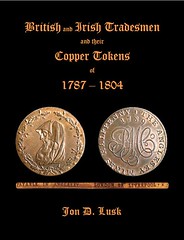 British and Irish Tradesmen and their Copper Tokens of 1787 – 1804
British and Irish Tradesmen and their Copper Tokens of 1787 – 1804
by Jon D. Lusk
Foreword by Peter Preston-Morley
Size 8 1/2' x 11"
400 pages
Hardbound
$109
It has been fifty years since a book dedicated to the subset of Dalton & Hamer tokens known as Tradesmen’s Tokens has been published. (It was R. C. Bell’s Commercial Coins.) The author of this new work reveals discoveries concerning the issuers, their lives, names, and occupations. Tokens are pictured in large size, and in color, along with photographs of the edges unwrapped into a straight line, using a technique perfected by the author. Variety identification photographs and availability ratings are included to assist the collector.
Using inclusion criteria developed by the author, he suggests four collections of these tokens each containing from 110 to 248 pieces. This book was written for collectors, or those interested in history. Better yet, it is meant for those who are both. It will be available from the author, Jon@Lusk.cc, at the beginning of August as well as at ANA 2014 in Chicago, and the Token Congress in Northampton in October.
BETTER PRICES FOR NUMISMATIC BOOKS FROM INDIA
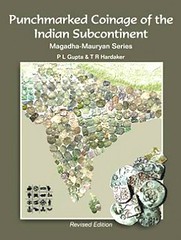 It is amazing what some Indian Book sellers charge in the USA for
Books from India.
It is amazing what some Indian Book sellers charge in the USA for
Books from India.
The List price of the PunchMark book is US$42 at IIRNS Publications: www.iirnspublications.com/our_pub_detail.php?id=131
They invoiced me with additional US$12 postage to Sri Lanka.
However IIRNS don't accept credit cards or PayPal and my Bank wanted US$30 to do the transfer to their account.
So the best source is given below from a posting by Jim Farr in the South Asia Coins Croup - it's half the price of Bagchee even after their 10% discount which is more like a 100% surcharge :-).
The second edition of Gupta and Hardaker, Punchmarked Coinage of the Indian Subcontinent, is available from www.printsasia.com. The link to the book is here: www.printsasia.com/book/punchmarked-coinage-of-the-indian-subcontinent-p-l-gupta-t-r-hardaker-9788186786352 .
They are located in New York, accept credit cards, and charge no shipping costs to U. S. addresses. They are offering the book at $48.99.
This is a very good deal for those of us who live in the U. S.
I just checked international shipping charges. They appear to charge $9.00 everywhere, so the total for international orders would be $57.99. So, it appears that you could order it from there for a decent price without worrying about bank charges if you use your credit card.
Chris writes:
www.printsasia.com has this title for about half delivered to the US than the publisher in India does. Scott Semans posted a link to them on his website (www.coincoin.com), so that is how I knew about it. I ordered a copy for less than $58 delivered. Just thought I would pass it along.
To read the earlier E-Sylum article, see: NEW BOOK: PUNCHMARKED COINAGE OF THE INDIAN SUBCONTINENT (www.coinbooks.org/esylum_v17n23a06.html)
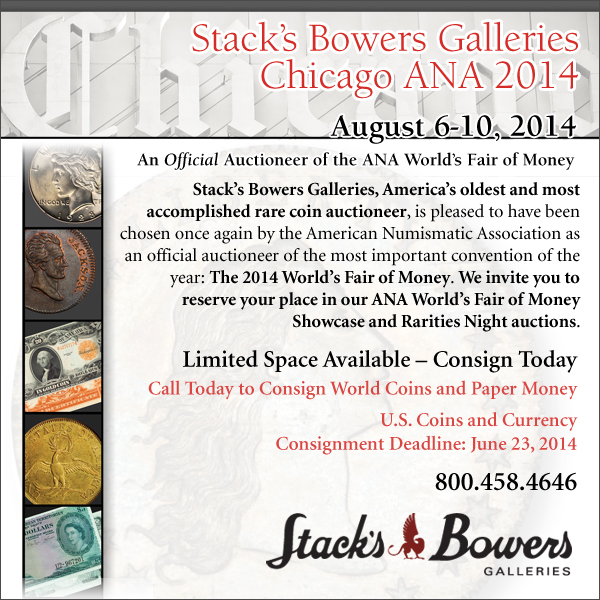
JOHN H. BURNS LAID TO REST
Pat McBride writes:
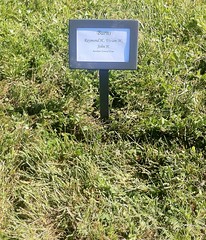 Numismatic book dealer John H. Burns and his parents' (Henry and Vivian) cremated remains were laid to rest with a graveside service on Saturday morning June 7, 2014. John is interred at Union Cemetery, Greensburg, PA.
Numismatic book dealer John H. Burns and his parents' (Henry and Vivian) cremated remains were laid to rest with a graveside service on Saturday morning June 7, 2014. John is interred at Union Cemetery, Greensburg, PA.
John’s father served in the U.S. Air Force on Tinian Island during the preparations for the Enola Gay’s famous mission during World War II. Our plan is to have a military marker placed at the grave along with a marker for John.
The generous contributions to the John Burns Memorial Fund made this possible. If you would like to contribute please go to the PAN website www.pancoins.org.
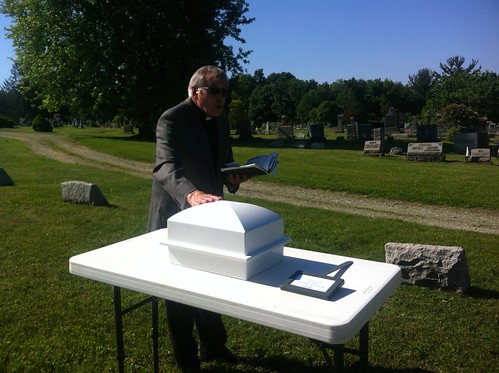
One of the many highlights of the night was Wayne Homren’s hilarious story about the 1988 visit to prominent numismatic book collector Armand Champa’s personal library and the follow up dinner that John was invited to and was disappointed in that it wasn’t at Armand’s usual excellent steakhouse that John was so looking forward to along with that big free steak.
Armand reassured him that the selected Italian restaurant was equally as good but John was not easily convinced. Armand took it upon himself to discreetly call the chef in advance and asked him to prepare a special dish with the emphasis on red meat for his special large friend.
As the numismatic luminaries were seated the chef appeared and placed before John’s eyes the largest meatball on a bed of spaghetti that the roomful had ever seen. The look on Burns’ face and the roar of laughter was priceless.
Armand passed away in 1997. I am sure John Burns and Armand are now recalling that special night and the great memories and numismatic book tales that were the passion that they each shared.
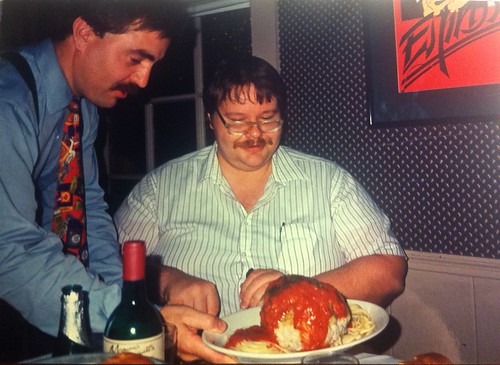
To read the earlier E-Sylum article, see: FINAL ARRANGEMENTS FOR JOHN H. BURNS (www.coinbooks.org/esylum_v17n23a14.html)
NOTES FROM E-SYLUM READERS: JUNE 8, 2014
Another Vote for 'By Its Cover' Eric Vanhove writes:
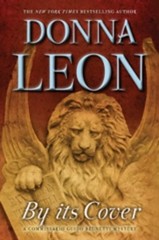 Regarding "By Its Cover": it is a great book, but then all of Donna Leon books are awesome! If anyone is interested in mysteries and Venice, a little on aspects of Italian culture. but always in a good read, then they should pick up a Donna Leon mystery! I've been reading them since 2003 and looking forward to May every year; May is when Ms. Leon releases her books. I literally tripped over one of her books... I was walking in a piazza in Rome near the Pantheon and stumbled over "Death at La Fenice", the first of her Brunetti mysteries. A day later I'd finished it and was hooked. Anyone that reads "By Its Cover" or any other of her books will be hooked as well.
Regarding "By Its Cover": it is a great book, but then all of Donna Leon books are awesome! If anyone is interested in mysteries and Venice, a little on aspects of Italian culture. but always in a good read, then they should pick up a Donna Leon mystery! I've been reading them since 2003 and looking forward to May every year; May is when Ms. Leon releases her books. I literally tripped over one of her books... I was walking in a piazza in Rome near the Pantheon and stumbled over "Death at La Fenice", the first of her Brunetti mysteries. A day later I'd finished it and was hooked. Anyone that reads "By Its Cover" or any other of her books will be hooked as well.
To read the earlier E-Sylum article, see:
BOOK REVIEW: BY ITS COVER
(www.coinbooks.org/esylum_v17n23a09.html)
North West Company Token Rarity Chris Faulkner writes:
There is a grievous error in the Coin World article on the North West Co. token which you excerpted in last week's E-Sylum. It's examples in copper which are much rarer than those in brass, not the other way around as reported. The one in Geoffrey Bell Auctions as part of the George Thomson collection -- which I catalogued -- realized $26,000 CAN. When the dust settled, that was a deserving price for a very high quality example.
To read the earlier E-Sylum article, see: 1820 NORTH WEST COMPANY TOKEN (www.coinbooks.org/esylum_v17n23a27.html)
Central States Publishing Grants Bruce Perdue writes:
The article about the "American Red Cross WWII Collector's Guide" failed to mention that Central States contributed through our book publishing grants to this book and Mark Ferguson’s "The Dollar of 1804". Central States Numismatic Society is committed to supporting numismatic publications and research through our Book Grants program as part of our Educational Mission. Grant applications for the next years program are available on our website : www.centralstates.info/grants.html/ .
To read the earlier E-Sylum article, see: NEW BOOK: AMERICAN RED CROSS WWII COLLECTOR'S GUIDE (www.coinbooks.org/esylum_v17n23a07.html)
THE BOOK BAZARRE
COURT CALLS FOR EXPERT TO SUPERVISE SS CENTRAL AMERICA ARTIFACTS
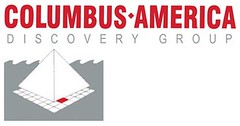 Court Orders SS Central America Artifacts to Remain in Custody of US Marshal
Norfolk, June 4, 2014: Chief United State District Judge Rebecca Beach Smith Monday ordered Recovery Limited Partnership (RLP), at its expense, to provide an expert to supervise the US Marshal’s handling of artifacts it has recovered from within an injuncted area of the Atlantic where the sidewheel steamer SS Central America sank during an 1857 hurricane.
Court Orders SS Central America Artifacts to Remain in Custody of US Marshal
Norfolk, June 4, 2014: Chief United State District Judge Rebecca Beach Smith Monday ordered Recovery Limited Partnership (RLP), at its expense, to provide an expert to supervise the US Marshal’s handling of artifacts it has recovered from within an injuncted area of the Atlantic where the sidewheel steamer SS Central America sank during an 1857 hurricane.
Judge Smith’s order, attached, says the artifacts “shall remain in the custody of the US Marshal,” and directs RLP to contact the US Marshal “forthwith” to make necessary arrangements.
Columbus-America Discovery Group (CADG), first finders of the SS Central America in 1987, previously had asked the court to order federal marshals to seize all items recovered to date by RLP and its contracted salvor, Odyssey Marine Exploration.
CADG originally located the wreck site in the Atlantic about 160 miles off the Carolina coast and subsequently recovered thousands of gold coins and hundreds of gold ingots. CADG was awarded salvor in possession status by the Norfolk federal court, and maintains it still has that court-granted exclusive right to the site to retrieve gold and artifacts.
In 2013, following lengthy litigation brought by two investors, an Ohio court appointed a receiver, Ira O. Kane, to handle business affairs of RLP and another company, Columbus Exploration. Kane contracted with Odyssey Marine and, without federal court approval, Odyssey began recovery of artifacts within the area protected by the CADG permanent injunction. CADG was not a party to the Ohio litigation.
"Columbus-America achieved discovery and recovery breakthroughs in the deep ocean for five years,” said Milt Butterworth, president of CADG. “We located a deep ocean shipwreck no one else had ever found. We invented a recovery vehicle and techniques to recover artifacts very carefully, which no one else had ever done,” he added.
“For example, the SS Central America was a US Mail steamship,” Butterworth said. “We always felt we would find mail. We avoided an area where we thought it might be to prevent any harm before we were confident we could recover it without damage,” he added.
“Then we were sued by 39 insurance companies,” Butterworth added. “Federal courts protected our work by awarding us a permanent injunction. After 5 years at sea and 23 years in court, we want to go back to the SS Central America and finish the job,” he said.
"Now we are asking the court to uphold our original permanent injunction, and allow us to fulfill our purpose: to protect the site and recover the treasure of the SS Central America, and deliver a return to our investors," Butterworth added.
To read earlier E-Sylum articles, see:
ODYSSEY MARINE TO ATTEMPT SS CENTRAL AMERICA SALVAGE
(www.coinbooks.org/esylum_v17n10a20.html)
COLUMBUS-AMERICA GROUP SUES ODYSSEY
(www.coinbooks.org/esylum_v17n21a10.html)
SS CENTRAL AMERICA LAWYER FINED FOR LYING TO COURT
John Kleeberg writes:
I came across this article from last month in the Columbus Dispatch, which indicates that things are getting very hot indeed.
A federal judge has ruled that the attorney for a shipwreck salvager repeatedly lied to the court about documents detailing how much gold had been recovered from a site off the coast of South Carolina.
U.S. District Judge Algenon L. Marbley concluded last week that Richard Robol “committed a fraud upon the court” by denying that his client possessed inventories of the more than $40 million in gold coins and bars brought up from the SS Central America shipwreck more than two decades ago.
Robol was the longtime attorney for companies operated by Tommy Thompson, who is now a federal fugitive. Investors in Thompson’s Recovery Limited and Columbus Exploration companies had tried for seven years to obtain the inventories.
They wanted to determine how much of the recovered gold was sold to California Gold Marketing in 2000 and whether any had been missing. Robol said in numerous court proceedings that California Gold possessed the only inventory.
A court-appointed receiver who took over Thompson’s companies last summer found more than 20 inventories of the gold in file cabinets taken from properties owned by Robol. Some were the original inventories made when the gold was removed from the shipwreck from 1988 to 1991.
The Dispatch Printing Company, an investor in Thompson’s expedition, filed motions for sanctions against Robol in October as part of a larger federal lawsuit regarding the shipwreck’s proceeds.
Steve Tigges, an attorney for Dispatch Printing, said that withholding the inventories and “misrepresenting their existence to the court” kept the court-ordered accounting of the gold and its proceeds hidden for years.
“It is very important to vindicate the integrity and dignity of the court,” Tigges said. “If lawyers are allowed to misrepresent facts without any consequences, the entire system does not work.”
Dave Bowers adds:
Very complex matter as it has been since the 1980s. Continually, each “side” feels it is right. In the long run numismatics will benefit greatly. With Bob Evans a part of both recovery efforts we can be certain that finds will be reported and curated accurately—lucky for all of us!
To read the complete article, see: Judge finds that attorney lied in case related to gold ship (www.dispatch.com/content/stories/local/2014/05/14/attorney-ordered-to-pay-costs.html)
THE BOOK BAZARRE
MORE ON HOBO NICKELS AND ETHNIC SLURS
Last week Bob Leonard wrote:
The ethnic slur nature of the original "hobo nickels" has been swept under the rug by modern collectors, but it is established by the existence of pot metal tokens imitating this design on the obverse, with the pawnbroker's three balls on the reverse.
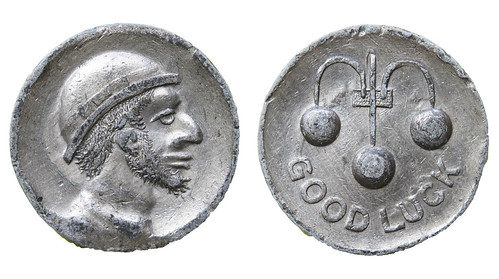
Bob Van Arsdell provided the above image of the piece referred to. He provides the dimensions as:
Weight: 6.7419 gms
Diameter: 23.62 mm
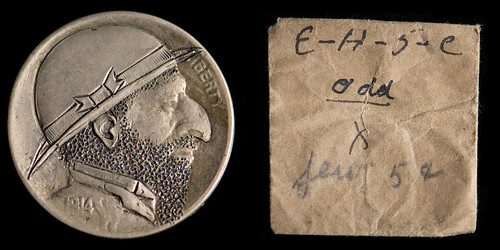
Alex Lynn writes:
I read with some interest last week's discussion of "sheeny" nickels. I am a first time contributor to the discussion here, and feel a bit 'funny' that my first contribution would be around an unpleasant subject. Attached are images of two examples of "sheeny" nickels from my own collection.
The first is on a 1914 Philadelphia nickel, and is accompanied by an image of the old (I believe 1940's) homemade collection envelope that it was in when I acquired it. The notation on the envelope leaves no question as to the ethnicity of the intended subject, and how that rendering was perceived back in the 40's.
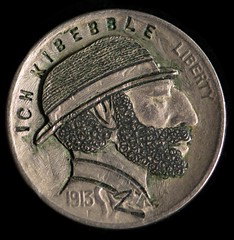 The second example is an "ICH KIBEBBLE" carving on a 1913 Philadelphia 'Type 1' nickel. The text is entered with somewhat small single-letter punches, very carefully placed.
The second example is an "ICH KIBEBBLE" carving on a 1913 Philadelphia 'Type 1' nickel. The text is entered with somewhat small single-letter punches, very carefully placed.
Both examples are submitted only for the sake of discussion and furthering understanding of this unpleasant tradition within the field of carved coins. I've puzzled over both of them for some time, and am interested to see what other examples readers are able to turn up.
Alex adds:
I heard the "Ich Kebibble" name a few times too, when I was very young, but didn't have much background info at the time. I've wondered if the phrase was understood as mock-Yiddish at the time of the "Isch Ga-Bibble" song's initial popularity, ca. 1913, or if that emerged later? In context of the song's original lyrics, it just seems like pure nonsense, but that was now a century ago, in a different world, almost. Probably a good question for a historian of popular song.
Yossi Dotan writes:
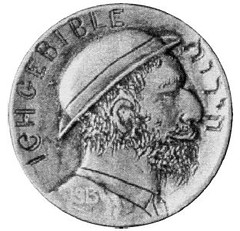 In The E-Sylum of June 1 you give an excerpt from Ira Rezak's letter which says "The Hebrew seems to me to be a slight misspelling (חירות instead of the proper חרות) of the word for “liberty”, which of course is merely a translation of the very word that had originally occupied this area, albeit in English."
In The E-Sylum of June 1 you give an excerpt from Ira Rezak's letter which says "The Hebrew seems to me to be a slight misspelling (חירות instead of the proper חרות) of the word for “liberty”, which of course is merely a translation of the very word that had originally occupied this area, albeit in English."
In Hebrew BOTH חירות and חרות are acceptable spellings, just like through and thru in English. Instead of a misspelling, I guess that the creator of the carving used a longer Hebrew word to fill up the space originally taken up by the word Liberty.
Marvin Tameanko writes:
I am older than most of your readers so should mention that Ish Kabiibble (correct spelling) was a coronet player named Merwyn Boque in Kay Kyser's swing orchestra (1940-50's) He clowned around on stage as well as played his instrument and was a well-liked character in Kyser's TV show in 1949-50, Kay Kyser's Kollege of Musical Knowledge. He was not Jewish.
Ron Thompson of Decatur, GA writes:
I’m always amazed at the quantity and quality of the weekly E-Sylum. How you keep it up is beyond me, but bless your heart –Thank you!
Regarding the Hobo Nickels and Ethnic Slurs article, as a medal collector I am amazed how people can discern motives from a few design elements. The comments reminds me of the art experts who try to tell you about the motives and meaning of art. I think the interpretations tell as much about the interpreter as they do about the art. I don’t see how the statements made about the ethnic slur nature of the item can be supported without knowing more about the artist and what he or she said about it.
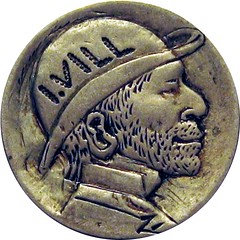 For one I think the "I VILL" nickel portrait looks a lot like General Sherman of Civil War fame who seemed to always like that style hat. Sherman also always seemed scruffy like the nickel guy. As a guy who grew up in a town with lots of reformed and orthodox Jewish people, I don’t think the profile is particularly Jewish. If that was the intent the artist certainly could have exaggerated things a bit more to make that point. Similarly with the hat, why not use a yamaka or yarmulke rather than a hat with a brim?
For one I think the "I VILL" nickel portrait looks a lot like General Sherman of Civil War fame who seemed to always like that style hat. Sherman also always seemed scruffy like the nickel guy. As a guy who grew up in a town with lots of reformed and orthodox Jewish people, I don’t think the profile is particularly Jewish. If that was the intent the artist certainly could have exaggerated things a bit more to make that point. Similarly with the hat, why not use a yamaka or yarmulke rather than a hat with a brim?
That aside, I would agree that the I VILL means I WILL but rather than a slur just against the Jewish folks, in particular, I think it might be a comment about the German people in general. Remember there was WWI and WWII with Germany. Germans, in general, were not popular here at the time this hobo nickel was probably created.
Also German Jews were not the only ones to have that language affliction as most people who grew up in Germany that came here had it. My Mom was born in the United States and was an American citizen her whole life, but her parents were from Germany and her father was recalled to Germany for WWI, so she grew up in Germany as a Roman Catholic. She came back to the US in the 1930s but until she died in the 1980s, as much as she tried, her W's came out as V's.
So what does it mean? Who knows? You either like it and find it interesting or you are on to the next one in your collector quest.
To read the earlier E-Sylum article, see: HOBO NICKELS AND ETHNIC SLURS (www.coinbooks.org/esylum_v17n23a15.html)
MORE ON THE '1915' HUDSON BAY COMPANY TOKEN
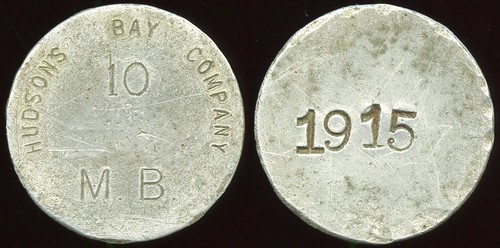
I saw the inquiry looking for more information on the Hudson's Bay Co. token Duane Feisel has. I do have the essential text (Gingras) and have found no image of this token. However, he repeatedly references that many examples were made locally by the various posts with their own supply of scrap metal. These were made in handfuls and in some of his articles in the RCNA journal he theorized that many are still sitting in their respective posts or nearby, untouched.
This appears to be the only HBC token I have seen or heard of that features a date. Post managers would not have had a need for a date, except maybe if they wanted to commemorate something (like Duane's theory on Fort George). Much more important were the initials and/or crest of the company, which illiterate trappers would know with confidence. However, in that case I would suspect there would be more commemoration to the design, even if working with crude tools.
The inclusion of a date could have been purposeful as the post managers' way of taking note of his tokens, in an historic sense. The company itself was notorious for not keeping much of any records on the production of even their officially struck tokens. Perhaps he would have wanted to be remembered.
Most tokens, but not all, describe the post they were used for, except most notably the Eastern Arctic, which was so far north as to not be confused with any other post or currency. Even the famous "N.B" token tells us it was from "E.M."
1915 as a date would reflect near the end of the prominence of the made beaver as the value of trade. However, there are many tokens issued by posts and some professionally struck, starting in 1919 and believed to go well into the 1920's.
Here's something interesting I found recently:
Tokens continued to be stamped out in remote posts as late as 1915. "Aluminum coins were used in the Hudson Strait area until 1915. They had replaced the earlier copper product." - MacKay, Douglas. "Tokens, Coins and Scrip: Notes on the Hudson's Bay Company's fur-trade currency." The Canadian Banker V44 No. 4 July 1937
This tidbit refers to the crude manufacture of tokens on a whim by post managers. It would make perfect sense in Hudson Strait, which received by boat, supplies only once a year. If a post manager needed to he would create currency or illustrate markers on a whim. I am not sure though the significance of 1915 from his reference point. He does not elaborate on it any further.
I received an email from Geoffery Bell Auctions in Moncton. They have not come across this token or heard of it and had no comment either way.
My interest and study of HBC tokens is a result of moving to Norway House Manitoba, a Cree Reserve. I live on treaty land but am not treaty status. There are many ruins here of the HBC and artifacts are found often. And yes, we really are "up there." Wild dogs are rampant, brown bears are common and on a June day we had a frost warning. It's never dull!
For more information on Norway House, see: Welcome to the Community of Norway House (www.norwayhousecc.ca)
To read the complete article, see: QUERY: '1915' HUDSON BAY COMPANY TOKEN (www.coinbooks.org/esylum_v17n22a19.html)
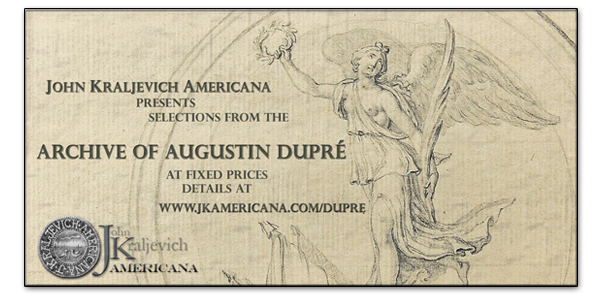
BILL NOYES ON CONDER TOKENS AND CONDER TOKENS
(Editor’s note: The following article was submitted to be published almost 20 years ago. It was not printed. When Bill Noyes, the foremost author on US large cents, heard that I was about to publish a new book similar to Bell’s Commercial Coins book he offered it again. He felt that the reason that it was not used then was that the powers-to-be wanted a balancing article. When that article wasn’t forthcoming they didn’t publish his. He left our organization because of the suppression of his piece.
Please read it as a 20 year old article as no attempt has been made to revise it to reflect things that have changed since it was written. I know that it is opinionated and provocative, and that everyone may find points with which they disagree. It is published here to promote debate, and to cause the readers to question and perhaps strengthen their own views of their collecting world. Better yet, why don’t you write a similar article stating your own views?)
by Bill Noyes
N.C.L.T (Non-Circulating-Legal-Tender): The term creates instant disgust and profound lack of interest in any serious collector of real coins, whether one is talking about the plastic wrapped gems sold by the U.S. mint or some pseudo-foreign power like the Marshall Islands. Expensive and almost always much, much cheaper in the after-market, they are sold to the novice and often sour these potential coin collectors on Numismatics as a hobby. The damage these “instant losers” create in the minds of the public is huge.
The profits for the mints and private companies involved are considerable, and these profits allow them to cater to the cataloguers who include them as “real” coins: The numismatic advertisers who promote their products in splashy full color, full page ads and the ANA and other bourses who allow them to sell to a trusting public who is fooled by the slick booths and endorsement of the ANA or other organizers. Even worse than these pseudo-coins are the various medals and medalets with or without some small “bullion value” depicting some popular theme like Lady Diana – dead or alive – or breeds of cats or WWII airplanes.
Do not misunderstand me; there is nothing wrong or silly about collecting medals or medalets with space flights or ships or some such, but you must be clear that you are collecting medals and medalets, that you are not collecting coins and that the value structure and the desirability and consequently resale value falls under exonumia, not “real” coins.
In between these “real circulating coins,” medals, and medalets fall tokens – issued and maybe guaranteed by private individuals. “Real tokens” actually circulated alongside or in place of real coins, usually as a convenience or necessity in remote areas or in times of acute shortages of “real coins.” Tokens have been used for many centuries in numbers and for durations dictated by economic necessity; NCLT has been around for centuries but has proliferated since the end of the silver era in 1963; and medals and medalets have been around for centuries, usually struck to commemorate some great personage or event in history like Abraham Lincoln or the sinking of the Lusitania.
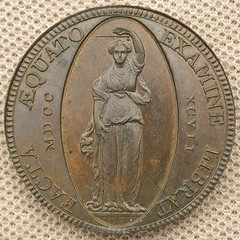 What, you might rightly ask, has all this tokens, medals, and NCLT business got to do with “Conder Tokens?” Actually, quite a bit because no series in history has such an undefined mixture of “real tokens,” pseudo-tokens, medals, medalets, and other numismatic ephemera than the issues lumped under “Conder tokens” by Dalton and Hamer.
What, you might rightly ask, has all this tokens, medals, and NCLT business got to do with “Conder Tokens?” Actually, quite a bit because no series in history has such an undefined mixture of “real tokens,” pseudo-tokens, medals, medalets, and other numismatic ephemera than the issues lumped under “Conder tokens” by Dalton and Hamer.
Having bought my first “Conder token” from Randolph Zander in 1956 and having upwards of 800 pieces encompassing every category above, I am surprised that the present influx of collectors knows so little about what they are buying as “Conder tokens.” Maybe I’m naïve to think that today’s collectors are going to bother to learn anything about what they are buying beyond a perception of value and grade, but I hope that the collector who buys “Conder tokens” has stepped beyond the “slabbed Morgan dollars” and Full-Bell-Lines Franklin halves and maybe even the MS68 type coins mentality or lack thereof and has arrived at collecting “Conder tokens” after studying the series literature and at least has formed a vague idea of what pieces he wants to collect within the series – not even the Bobbes aspire to all 5000+ listed by D&H.
I suspect many, if not all, of the “new” Conder collectors just buy what appeals to them and in whatever grade (unfortunately many require the MS65 red as a residual of some past numismatic brainwashing) they can afford. These “appeal” buyers can rapidly acquire 400-500 without ever exceeding $50 each, even in nice UNC, but they will never acquire any of the most sought after pieces. To truly collect “Conder tokens,” a collector must break down the 5000+ D&H pieces into attainable groups.
R.C. Bell attempted to do this in the 1960s with varying degrees of success, but unfortunately, his books are out of print and quite hard to find. The point of all this is that there are “Conder tokens” and there are “Conder tokens,” and before a new collector takes out his wallet to buy a shiny new piece, they need to know what type of “Conder Token” they are buying because various types are more appealing, and unfortunately with more appeal goes the old numismatic problem child: More Value.
Although this is a huge overstatement, “real tokens” tend to be more valuable in numismatics than tokens struck for collectors, medals and medalets, and other miscellanea. “Real tokens” are themselves usually of less value than “real coins.” The premise is that given equivalent metals and rarities, a real coin will be worth more than a real token which will be worth more than a real medal and NCLT coins; tokens and medals will almost always be worth less than their coin counterparts.
As I said, this is an oversimplification but will serve the novice collector well as he tries to make sense out of the 5000+ D&H varieties. I cannot recommend more highly R.C. Bell’s Commercial Coins: 1787-1804. Not counting the Scottish issues of Farthing size in the end of D&H, Bell has identified most of the “real Conder tokens” – these are the necessity pieces that circulated alongside real coins or in place of them. An astute student can quibble with a few Bell included and argue about several omissions, but the 250+ listed by Bell are a sane and logical group for the new collector to start with.
Another very important offshoot of limiting your collecting to “real Conder tokens” is the collector will avoid the trap of buying many flashy but undesirable pieces that are not tokens but medalets or some such and thus valued by astute collectors at less than “real tokens” in equivalent grade. Many of the most attractive, large size “Conders” are in reality low mintage medals struck specifically for “collectors.”
These “non-token Conders” are certainly collectable but only by someone who understands where they fit in the numismatic chart of appeal and value. The fact that many of these say “token” means absolutely nothing – the now “famous” Sawbridgeworth ($41,900) says token but is surely no more than a high relief medal that was struck to take advantage of the “token craze” of the 1790s-early 1800s in Great Britain, and this frenzy was really the first proliferation of NCLT (and I’m using this term here a bit loosely to refer to non-circulating tokens) and medalets for the unsophisticated collector. The passage of time (200 years) does not transform a Kempson’s Gate from a medal to a real token – they were produced for sale to collectors and never intended to circulate – they were not “real” then, nor are they today.
To state the obvious, I have a great dislike for any numismatic item struck for the specific purpose of making money for direct sale to collectors with no intent to create a circulating medium – whether it be modern U.S. silver commems or Spence’s political medalets – Kempson’s buildings are no better than a set of Franklin mint ingots depicting the 50 U.S. state birds. I have no such contempt for real medals, such as the Middlesex political series that usually commemorates some historical personage or event, but the collector must understand that he is buying/collecting medals, not coins or tokens.
The CTCJ is the journal of the Conder Token Collector's Club. For more information on CTCC, see: www.ctcc.info
COLLECTING COUNTERSTAMPS BY DENOMINATION
OIL of ICE on 1864 Two Cent Piece
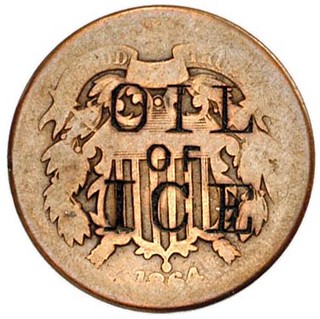
Counterstamped 1864 two-cents, Large Motto.
Brunk O-59. OIL / OF / ICE on obverse. Host coin Good. Medium tan.
From the Wayne Homren Collection.
To read the complete lot description, see: Counterstamped 1864 two-cents, Large Motto. (prior.stacks.com/lotdetail.aspx?lsid=AN00000582&asid=AN00000074&lrid=AN00035908)
I.B.B. ST. LOUIS MO on 1852 Half Dime
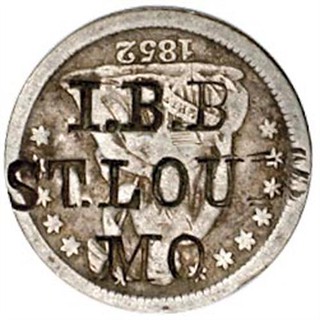
Counterstamped 1852 half dime.
Brunk B-45. I.B.B. / ST. LOUIS / MO on obverse. Host coin Fine.
Isaac B. Burbbayge was a St. Louis, MO merchant for decades, dealing in maps of western rivers and other goods, including at one time, slaves.
From the Wayne Homren Collection.
To read the complete lot description, see: Counterstamped 1852 half dime. (prior.stacks.com/lotdetail.aspx?lsid=AN00000582&asid=AN00000074&lrid=AN00035905)
CLOWNS on 1875 Twenty Cent Piece
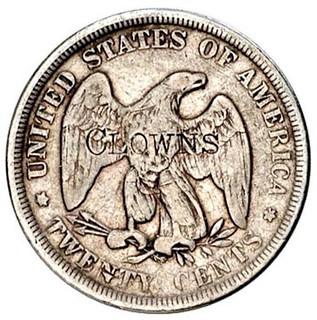
Counterstamped 1875 20¢.
Brunk C-617. CLOWNS at center of reverse. Host coin VF. This piece is mentioned in the new Brunk reference as the solitary example of the variety known. An unusual counterstamp, one that could mean anything from an affinity for Ringling Brothers and Barnum & Bailey characters, to a statement as to the contents of the U.S. House of Representatives—the possibilities are endless.
From the Wayne Homren Collection.
To read the complete lot description, see: Counterstamped 1875 20¢. (prior.stacks.com/lotdetail.aspx?lsid=AN00000582&asid=AN00000074&lrid=AN00035895)
H.A. GRISWOLD on 1819 Quarter
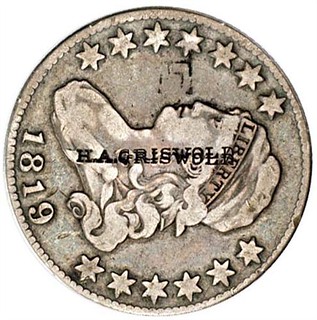
Counterstamped 1819 quarter.
Brunk G-581. H.A. GRISWOLD on obverse. Host coin VF. On an attractive host coin with nice details. This is the only counterstamped early quarter we recall having seen. For a collection such as Wayne Homren's where the focus is on unusual host coins, this is certainly a centerpiece. Griswold was silversmith and jeweler who worked in Whitehall, New York in the 1850s. His mark is also known on an 1819 large cent, and 1840 half dollar, and a hard times token.
From the Wayne Homren Collection.
To read the complete lot description, see: Counterstamped 1819 quarter (prior.stacks.com/lotdetail.aspx?lsid=AN00000582&asid=AN00000074&lrid=AN00035901)
J. DEMUTH on 1795 Flowing Hair Dollar
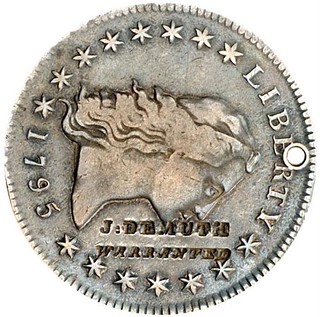
Counterstamped 1795 Flowing Hair dollar. BB-25, B-6. Rarity-3 as a variety. J. DEMUTH/WARRANTED. Brunk D-276. Mark and host VF.
Holed at 12:30 relative to obverse. A beautiful countermarked Flowing Hair dollar. Glossy dark gray with lighter gray highlights. Minor flaw under OF on the reverse. This mark is listed in Brunk, who suggests Demuth may have been a tool and punch maker circa 1832. Russ Rulau has posited that this marks is associated with the Demuth family of gunsmiths in Pennsylvania ca. 1770-1830. It is listed in Brunk mostly on large cents, save for a single 2 reales and an 1825 half dollar. The Reiver Collection contained a single countermarked Flowing Hair dollar, but since the host was an R-7 variety the price comparison is not relevant. This piece would be a great addition to any early dollar or countermark collection.
From the Wayne Homren Collection.
To read the complete lot description, see: Counterstamped 1795 Flowing Hair dollar (prior.stacks.com/lotdetail.aspx?lsid=AN00000582&asid=AN00000074&lrid=AN00035796)
N.E. TAYLOR on 1800 Bust Dollar
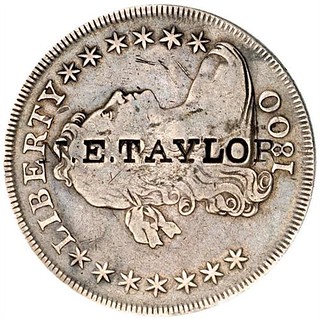
Counterstamped 1800 BB-195 dollar. R-4 as a die variety. N.E. Taylor. Brunk T-96. Mark EF, Host F.
This counterstamp was only known to Brunk on this particular coin. Nice deep gray with appealing surfaces and a few nicks in the lower right obverse field. Marked on both obverse and reverse. A very pleasing example on an unusual host.
The expansive Reiver Collection included five counterstamped Draped Bust dollars, ranging from a well worn piece with a simple mark at $1,000 to a high-grade piece plated in Brunk (like this one) for over $5,000. Counterstamped early dollars are rarely encountered in the marketplace and are eagerly snapped up by specialists when they do appear.
From the Wayne Homren Collection.
To read the complete lot description, see: Counterstamped 1800 BB-195 dollar. (prior.stacks.com/lotdetail.aspx?lsid=AN00000582&asid=AN00000074&lrid=AN00035887)
T. BERRY on 1907-D Half Eagle
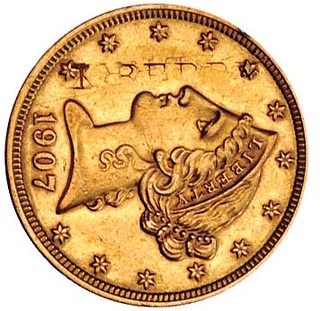
Counterstamped 1907-D half eagle.
Brunk B-604. T. BERRY on obverse. Host coin AU. The Brunk reference notes a solitary T. BERRY counterstamp on an 1875-S 20¢ with no other denominations mentioned. A highly unusual high-denomination counterstamp.
From the Wayne Homren Collection.
To read the complete lot description, see: Counterstamped 1907-D half eagle. (prior.stacks.com/lotdetail.aspx?lsid=AN00000582&asid=AN00000074&lrid=AN00035894)
THE BOOK BAZARRE
3 Important Books on Countermarked Coins!With DISCOUNTED Price
WWW.EXONUMIA.COM/FS/CM1.HTM
Other EXONUMIA Books at WWW.EXONUMIA.COM/Books.htm
DENMARK COIN POSTCARDS
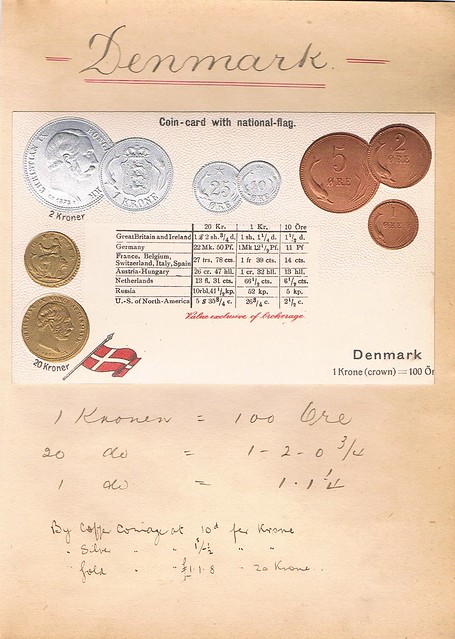
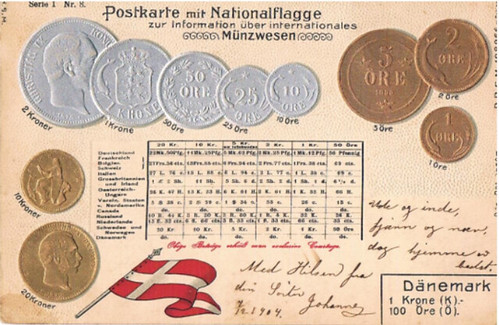
To read the earlier E-Sylum article, see: READER COMMENTS ON NUMISMATIC POSTCARDS (www.coinbooks.org/esylum_v17n23a16.html)
2014 MINT DIRECTORS CONFERENCE REPORT
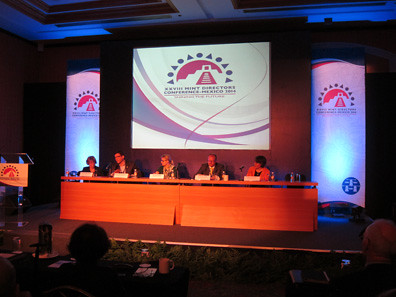
Between 11 and 14 May 2014, the 28th Mint Directors Conference took place in Mexico. Mint representatives from approximately 40 nations discussed current issues relevant to coin manufacturers.
“Mi casa es tu casa.”, translates in English as “My home is your home.”, as the Mexicans welcome their guests. At the heart of this saying is the incredible hospitality a stranger enjoys when coming to Mexico. This hospitality experienced the attendants of the 28th MDC, conducted by Casa de Moneda in Mexico City, first-hand. “Mi casa es tu casa.” – with these words Guillermo Hopkins Gámez, who had taken over as CEO of Casa de Moneda de México only a couple of weeks before, welcomed his guests.
A beautiful, old ticket hall supplied the background for the first official meeting of the conference participants. Here they tasted the first mescal and the first tequila to the effect that the acoustic level rose a bit. It was something like a family get-together. Everybody greeted friends he had not seen in a long time. After all, the ones involved in the production of coins are so few in number that all are well-acquainted. That promoted cooperation and made everyone be in a good mood in no time.
You must not assume, on the other hand, that a congress is accompanied by too much revelry. Quite the contrary, the schedule’s main characteristic was that is seemed to neglect the fact that human beings need a little bit of sleep from time to time in order to give their attention to the challenging papers and discussions.
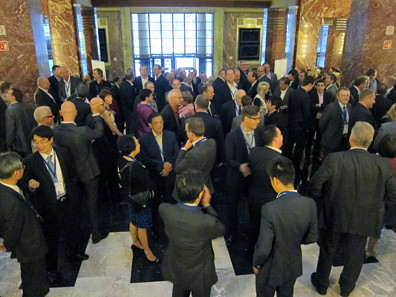
The busy program notwithstanding there was some spare time left for evening events. Traditional highlight was the gala dinner held at a very special location, the Mint Museum of Caseade Moneda, a fully functioning mint with machinery as it had been state of the art around 1900. The mint museum, too, was something so special that we will give you an account of it in a separate article.
Divided into a number of groups, they visited the production sheds. It was a highly interesting tour because Casa de Moneda is one of very few companies that can give you an understanding of virtually every single step involved in the production of a coin, from casting the coils of which the blanks are made, designing the subjects for a coin up to the production of dies, the coining and packaging.
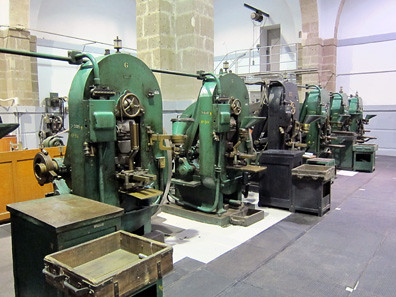
Casa de Moneda minting room
To read the complete article, see: Shining the Future - Mint Directors Conference in Mexico (www.coinsweekly.com/en/News/4?&id=2808)
THE BOOK BAZARRE
DOMINICAN REPUBLIC SAMANA BAY FRUIT CO. NOTE
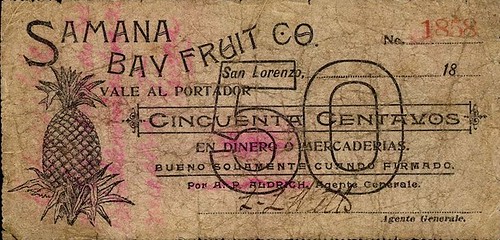
122 x 58 mm. This company was organized by an American, Julius H. Preston, who also became its president. Though the note shows a pineapple, the company was engaged heavily in banana production. The most prominent collector of Dominican Republic notes tried to buy this same piece from me about 25 years ago; he never succeeded in locating another example. Uniface. Multiple pinholes, some faded red overprinted lines at left; well used yet fully intact and overall quite pleasing. A once in a lifetime offer!
Neil Shafer adds:
Lot 5290 is an excellent example of what the token collectors go through constantly- the well-used condition of what is apparently the sole survivor of a given issue. If the highest profile collector cannot locate an example with all the connections he must have built over the years, then you know for a fact that the piece is a rarity.
To read the complete lot description, see: NL 50 Centavos 18xx (ca. 1880) (www.lynknight.com/ShowAuctionDetails.Asp?auction_Id=222300)
1919 RUSSIA 50 KOPEKS SHIMADA NOTE
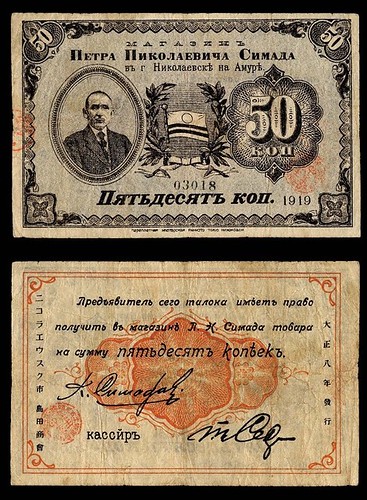
112 x 72 mm; imprint states Yamamoto in Tokyo. Shimada and flag; printed on soft paper. Shimada was a Japanese store owner in Nikolaevsk on Amur, a town near Khabarovsk in Siberia. Japanese interventionist forces were part of the attempt to dislodge Bolsheviks from the area. Japan retained occupation forces even after others had left in 1920. Some merchants found a need to issue their own money, as did Shimada. Such issues are now extremely difficult. We are pleased to offer a complete set of three denominations. The present example is a well preserved original in lovely condition. Good color.
Neil Shafer adds:
Lot 5628 is a rare issue from a Japanese-owned store, this time in Russia. Such issues have proven to be extremely difficult to locate, I don't believe I have seen any such pieces offered in the last 15 years at least.
To read the complete lot description, see: NL 50 Kopeks 1919 (www.lynknight.com/ShowAuctionDetails.Asp?auction_Id=225905)
ARABIAN AMERICAN COMPANY 10 POINTS NOTE
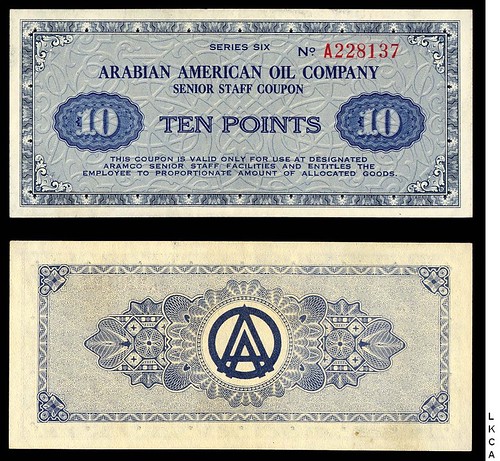
Series Six. "Senior staff" coupon, referring to employees from the West; these were used at a completely different facility than non-senior staff. Also used outside the base. Unbelievable original; by far the best I have ever seen. World Banknote Grading terms this "Ch. AU 58 light soiling". Few known to exist today.
Neil Shafer adds:
The one quality that separates Lot 5642 from any others is its high grade. There have been a couple of others that have shown up but they showed signs of heavy use. I have had this particular example for about 20 years, having found it at a large numismatic convention in California.
To read the complete lot description, see: NL 10 Points ND (www.lynknight.com/ShowAuctionDetails.Asp?auction_Id=218469)
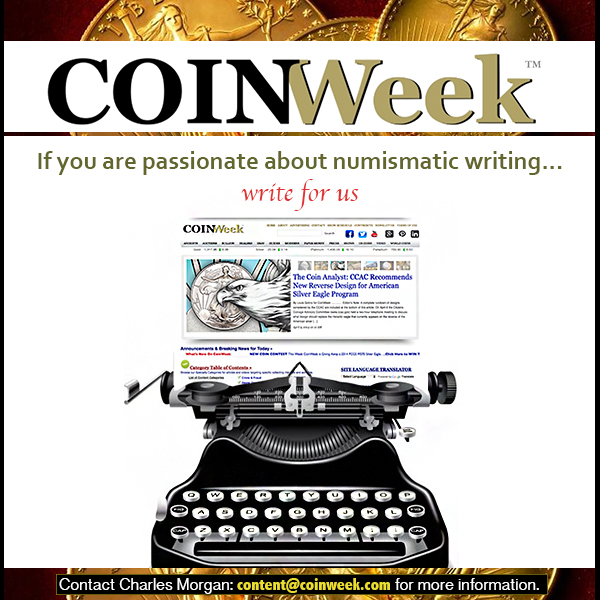
ROMAN COIN MOULDS IN ARCHAEOLOGICAL LITERATURE
Bob Van Arsdell writes:
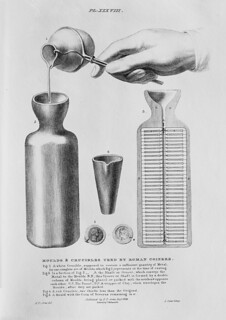 I've been somewhat surprised about the Roman Coin Mould fuss. They are nothing new.
I remember Alex Malloy had some for sale at the March, 1976 NY Metropolitan show. People still offer them on the Internet.
I've been somewhat surprised about the Roman Coin Mould fuss. They are nothing new.
I remember Alex Malloy had some for sale at the March, 1976 NY Metropolitan show. People still offer them on the Internet.
These things have been recorded for almost 350 years. Hundreds were found at Edlington, Somerset in 1670 and were recorded by John Aubrey. At the time, everyone knew exactly what they represented. They're mentioned in Camden's Britannia (1789 "Gough" edition) and a fuller account by J. Poole appeared in Archaeologia, 1808. My favorite illustration of the way they were used is from E. T. Artis, Durobrivae, 1828 (image attached).
Perhaps this is a good place to suggest that people interested in ancient coins will be well served by looking into the archaeological literature.
To read the earlier E-Sylum articles, see:
NOTES FROM E-SYLUM READERS: JUNE 1, 2014 : More on the Roman Coin Mould
(www.coinbooks.org/esylum_v17n23a13.html)
MOULD FOR COUNTERFEIT ROMAN COINS EXHIBITED
(www.coinbooks.org/esylum_v17n22a25.html)
ELEPHANTS ON ANCIENT COINS
Wild animals that cannot really be domesticated, elephants have a long and often painful history of interaction with humans. The Indus Valley civilization used captive Asian elephants as early as 2000 BCE for logging, transportation and ceremonial processions.
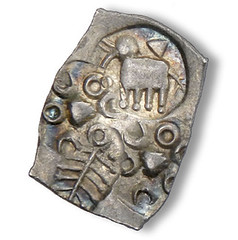 India, not surprisingly, provides the earliest appearance of elephants on coins.
The “karshapana”, or “punch-marked silver” coinage of India, dates from 600 BCE to
c300 CE. Simple but distinctive images of elephants appear, along with bulls, crescents, stars and sunbursts.
India, not surprisingly, provides the earliest appearance of elephants on coins.
The “karshapana”, or “punch-marked silver” coinage of India, dates from 600 BCE to
c300 CE. Simple but distinctive images of elephants appear, along with bulls, crescents, stars and sunbursts.
Elephants continue to appear on Indian coinage right down until modern times.
The earliest representation of an elephant on Greek coinage was a result of Alexander’s campaign in India.
Romans first encountered elephants in battle in 280 BCE, when Pyrrhus, king of the Greek region of Epirus, invaded Italy with an army of 25,000 men and 20 war elephants. The Romans recorded the appearance of the animals on some of the heavy bronze ingots they used as currency at the time. Pyrrhus established his base at the Greek city of Taras, which placed a small image of an elephant below a dolphin rider on its silver coinage.
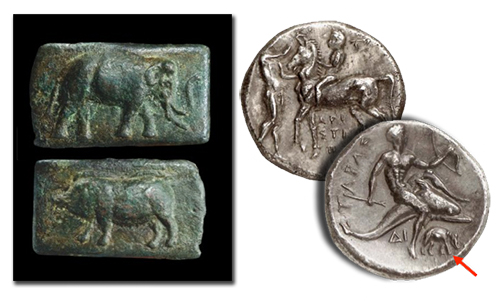
Coins depicting the Pyrrhic War
To read the complete article, see: Elephants on Ancient Coins (www.coinweek.com/featured-news/elephants-ancient-coins/)
LIAM O'CONNOR'S CHAIN LINK MEDALS
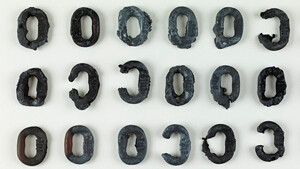
Over the past four years I have been making work in response to a building site at the British Museum that has now become the World Conservation and Exhibitions Centre.
I have been privileged to explore this transforming landscape and have attempted to describe it, or allow it to describe itself, through the objects and drawings I have made.
Philip Attwood, Keeper of the Department of Coins & Medals, introduced me to the Museum's modern medal collection, and, impressed by these objects, I wanted to make something in response. I was interested in the repetitious activities on the site, such as the picking up and putting down of clay or the construction of steel cages to reinforce the concrete, as the same process seemed to result in a slightly different outcome each time, a unique result. I had also been working a lot with objects taken from the site rather than making my own. With these two ideas in mind, Willie Shaw of Mace, the main contractor, donated a crane lifting chain, and PAD contractors separated the chain into its 800 individual links and stamped each one with a commemorative mark I had designed.
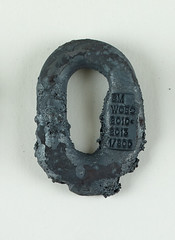
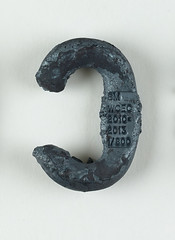
Once the building is complete all these medals will be displayed temporarily and each of the people who have worked on the project will choose a medal from this display, so the piece of work will disperse among everyone who has contributed to the building project.
To read the complete article, see: Documenting the Museum’s changing landscape (blog.britishmuseum.org/2014/06/05/documenting-the-museums-changing-landscape/)
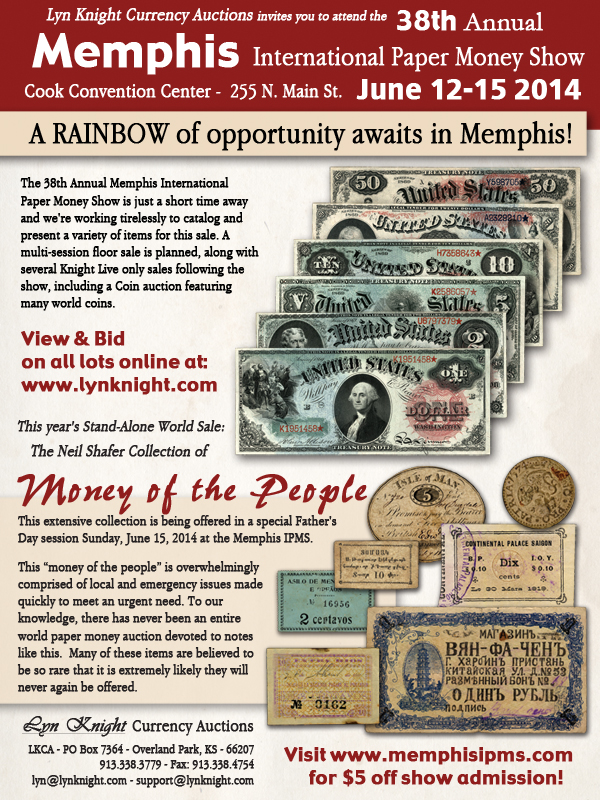
CLAD COIN CAMEO CARVINGS
By Carol Bastable RM576
Hobo nickel watchers may have noticed a new trend happening this last year. The much loved traditional buffalo nickel host coin has a new rival, clad coinage. Ron Landis began making what he called "cameo" carvings possibly as early as 1982. He used to carve away the background on dimes, revealing the copper core while leaving the existing portrait untouched. Then for fun he put them into circulation. Just ponder how many error collectors down the road thought they really had something.
His first real Clad Cameo Carving (CCC) was the Sacagawea dollar just after the newly released coin hit circulation. It had a traditional hobo portrait in the manganese/brass alloy with copper fields revealed. Later a few other carvers like Joe Paonessa (in 2005), Bill Jameson (2008), Dave Jones (2008) and Adam Leech (2009) also made these CCC coins.
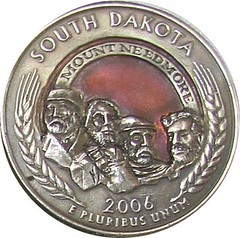 Then at the 2013 FUN show, Landis brought with him a newly carved South Dakota state quarter of Mount Rushmore. The fields had deep engraving revealing a copper core for contrast and the faces on Mt. Rushmore were re-engraved. The bird in flight was removed from the sky and replaced with a banner which read “MOUNT NEEDMORE”. It was not seen by many because it was snapped up into a private collection fairly early in the show.
Then at the 2013 FUN show, Landis brought with him a newly carved South Dakota state quarter of Mount Rushmore. The fields had deep engraving revealing a copper core for contrast and the faces on Mt. Rushmore were re-engraved. The bird in flight was removed from the sky and replaced with a banner which read “MOUNT NEEDMORE”. It was not seen by many because it was snapped up into a private collection fairly early in the show.
The next appearance of clad was by Paolo “Mrthe” Curcio. He regularly posts his carvings on the OHNS Facebook page and also lists many on eBay so his coins reach a large audience. His Clad Cameo Carvings went one step further with ornately engraved designs in the newly revealed copper fields. His designs consist of skulls, big-head mini-men, Frankenstein, and a traditional style hobo portrait with derby hat.
Oddly enough, Curcio came up with his designs by accident and had not seen the few earlier examples by other artists. He started carving what he believed to be a silver half dollar and got a shocking surprise when he hit copper at the center. One can only imagine the expletives that he was thinking or came out of his mouth. After the initial shock, in his words he “started playing with it.” He found he had a lot of fun with it and the result was a lot more Clad Cameo Carvings.
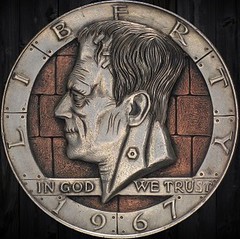
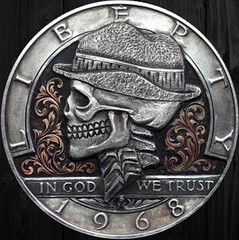
 The story brought back memories for me of a similar technique I was taught in preschool. I think we called it "black magic". We made designs in random color on a piece of paper, then colored over the whole thing with a black crayon. Then, using some implement we scraped away portions of the black surface to reveal the colors below to make our pictures. Hadn't thought of that in << cough >> decades...
-Editor
The story brought back memories for me of a similar technique I was taught in preschool. I think we called it "black magic". We made designs in random color on a piece of paper, then colored over the whole thing with a black crayon. Then, using some implement we scraped away portions of the black surface to reveal the colors below to make our pictures. Hadn't thought of that in << cough >> decades...
-Editor
For more information on the Original Hobo Nickel Society, see: www.hobonickels.org
ROYAL MINT ISSUES FIRST WORLD WAR OUTBREAK COINS
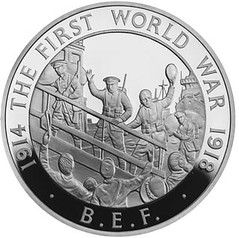
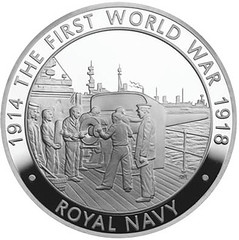
The Royal Mint has launched an expansive new coin series which will tell the story of the First World War from outbreak to armistice. The first six coins of the series, which are available for pre-order, mark the centenary of the outbreak. The series will continue to build over the next five years to a complete collection of 36 coins.
This year’s releases explore a range of diverse themes including the Howitzer gun, the impact of propaganda, the first black officer in Britain’s armed forces, the Royal Navy, the British Expeditionary Force, and the hard work on the Home Front.
Each of the six coins carries a denomination of £5 and is struck in .925 sterling silver to proof quality. The weight of each coin is 28.28 grams and hte diameter is 38.61 mm. The obverse design for each coin carries the Ian Rank-Broadley effigy of Queen Elizabeth II.
To read the complete article, see: UK 2014 First World War Outbreak Silver Proof 6 Coin Set (world.mintnewsblog.com/2014/06/uk-2014-first-world-war-outbreak-silver-proof-6-coin-set/)
ROYAL MINT ISSUES: EXPLORATION AND HAUNTED CANADA
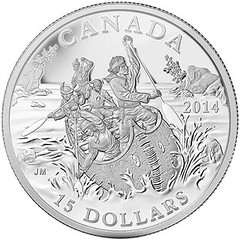
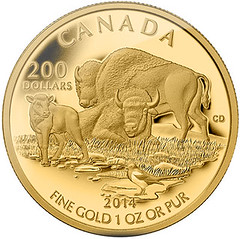
The Royal Canadian Mint has started accepting orders from the general public for their latest round of monthly new product releases. This includes the initial releases for new series on the exploration of Canada and haunted Canada, a new bison themed gold coin, a silver coin to mark the 70th anniversary of D-Day, and more.
All of the new products can now be found within the new releases section of the Royal Canadian Mint’s website.
The first release within the new series entitled “Exploring Canada” features the Voyageurs, who were engaged in transporting furs by canoe during the fur trade era. The reverse design features a dramatic scene of voyageurs canoeing through river rapids.
Each coin is struck in 99.99% silver with a matte proof finish and weight of 23.17 grams. The maximum mintage is 15,000 pieces.
A 1 oz gold proof coin is entitled “The Bison at Home on the Plains” and carries a depiction of male and female plains bison with a young calf. This continues the recent run of bison themed coins from the Royal Canadian Mint.
Each coin is struck in 99.99% purity with a diameter of 30 mm. The maximum mintage is just 350 pieces.
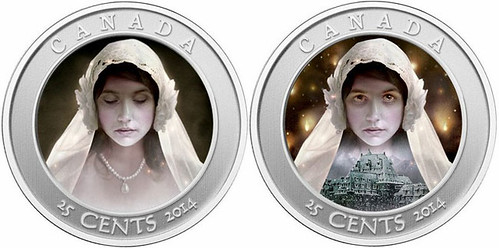
The first coin in a new series entitled “Haunted Canada” celebrates the legend of the Fairmont Banff Springs Hotel Ghost Bride. According to legend, she has made the hotel her eternal home since the 1930′s when she stumbled on a staircase to her death on her wedding day.
The reverse design tells the story through the use of lenticular technology. A colored portrait shows the bride with her eyes closed and when the coin is tilted her eyes appear opened with lit candles in the background and the Fairmont Banff Springs hotel below.
This cupro nickel 25-cent coin carries a maximum mintage of 15,000 pieces.
To read the complete article, see: Royal Canadian Mint New Product Releases June 2014 (world.mintnewsblog.com/2014/06/royal-canadian-mint-new-product-releases-june-2014/)
MORE ON THE EMPEROR NORTON BRIDGE CAMPAIGN
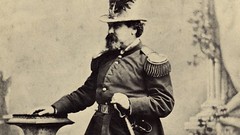 I'm the founder of The Emperor's Bridge Campaign.
Last July, I authored the Change.org petition to name the entire San Francisco-Oakland Bay Bridge for Emperor Norton. This was, in effect, an attempt to "reinvigorate" the original idea behind the 2004 effort profiled in the San Francisco Chronicle article you excerpt.
I'm the founder of The Emperor's Bridge Campaign.
Last July, I authored the Change.org petition to name the entire San Francisco-Oakland Bay Bridge for Emperor Norton. This was, in effect, an attempt to "reinvigorate" the original idea behind the 2004 effort profiled in the San Francisco Chronicle article you excerpt.
Notwithstanding the California state legislature's decision, late last summer, to name the bridge's West Bay Crossing for former California Assembly Speaker and former San Francisco mayor Willie Brown...
The Change.org petition had driven the local media counter-narrative to the Willie Brown naming --- and there still was 3,800 signatures' worth of energy behind it. (Now, nearly 4,700 signatures.) So I launched The Emperor's Bridge Campaign in late September.
We've held a number of public events --- most recently, last week's fundraiser --- and we very soon plan to incorporate as a 501(c)(4) nonprofit membership organization. Our Web site is EmperorsBridge.org.
Whatever happens with naming of the Bay Bridge, we envision the Campaign as an organization that continues to be the leading public resource dedicated solely to teaching about — and celebrating — the life and legacy of the Emperor. Those who wish to support --- or even just keep up with --- the Campaign are encouraged to sign up for our newsletter. They also can join us on Facebook and follow us on Twitter.
To read or sign the Change.org petition, see: NAME THE SAN FRANCISCO-OAKLAND BAY BRIDGE FOR EMPEROR NORTON (www.change.org/petitions/name-the-bay-bridge-for-emperor-norton)
To visit the website, see: The Emperor's Bridge Campaign (www.EmperorsBridge.org)
To sign up for the newsletter, see: The Emperor's Bridge Campaign (www.EmperorsBridge.org/signup)
To follow the group on social media, see:
Facebook
(www.facebook.com/groups/emperorsbridge/)
Twitter
(twitter.com/EmperorsBridge)
To read the earlier E-Sylum article, see: EMPEROR NORTON'S BRIDGE (www.coinbooks.org/esylum_v17n23a36.html)
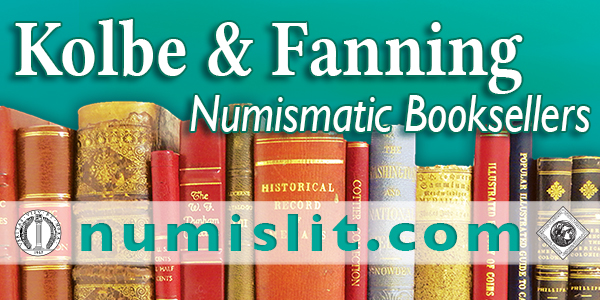
HARVARD BOOK BOUND IN HUMAN SKIN
Good news for fans of anthropodermic bibliopegy, bibliomaniacs and cannibals alike: tests have revealed that Houghton Library’s copy of Arsène Houssaye’s Des destinées de l’ame (FC8.H8177.879dc) is without a doubt bound in human skin.
Harvard conservators and scientists tested the binding using several different methods. According to Senior Rare Book Conservator Alan Puglia, they are 99% confident that the binding is of human origin.
Microscopic samples were taken from various locations on the binding, and were analyzed by peptide mass fingerprinting, which identifies proteins to create a “peptide mass fingerprint” (PMF) allowing analysts to identify the source.
Bill Lane, the director of the Harvard Mass Spectrometry and Proteomics Resource Laboratory, and Daniel Kirby of the Straus Center for Conservation and Technical Studies described the results:
“The PMF from Des destinées de l’ame matched the human reference, and clearly eliminated other common parchment sources, such as sheep, cattle and goat. However, although the PMF was consistent with human, other closely related primates, such as the great apes and gibbons, could not be eliminated because of the lack of necessary references.”
Although unlikely that the binding was made from a primate source, the samples were further analyzed using Liquid Chromatography-Tandem Mass Spectrometry (LCMSMS) to determine the order of amino acids, the building blocks of each peptide, which can be different in each species.
“The analytical data, taken together with the provenance of Des destinées de l’ame, make it very unlikely that the source could be other than human,” said Lane.
Houghton’s book is now the only known book at Harvard bound in human skin. Similar testing done on books thought to be bound in human skin at the Harvard Law School Library and the Harvard Medical School’s Countway Library revealed that both were actually bound in sheepskin.
Houghton’s book contains a very specific note from the late 19th century detailing the binding’s origin. This was not the gruesome pastime of just one individual; there are many accounts of similar occurrences in the 19th century, in which the bodies of executed criminals were donated to science, and the skins given to tanners and bookbinders.
To read the complete article, see: Caveat Lecter (blogs.law.harvard.edu/houghton/2014/06/04/caveat-lecter/)
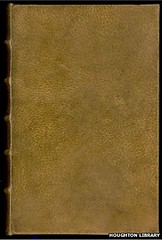 Located within Des destinees de l'ame is a note written by Dr Bouland, stating no ornament had been stamped on the cover to "preserve its elegance".
Located within Des destinees de l'ame is a note written by Dr Bouland, stating no ornament had been stamped on the cover to "preserve its elegance".
"I had kept this piece of human skin taken from the back of a woman," he wrote. "A book about the human soul deserved to have a human covering."
The book, said to be a meditation on the soul and life after death, is believed to be the only one bound in human skin at Harvard.
Comparable tests undertaken on books at the university's law and medical school libraries revealed books bound in sheepskin.
To read the complete article, see: Harvard University book bound in human skin (www.bbc.com/news/world-us-canada-27721571)
To read the earlier E-Sylum article, see: HARVARD BOOK NOT BOUND IN HUMAN SKIN AFTER ALL (www.coinbooks.org/esylum_v17n16a29.html)
PROFOUND MONEY JOKES
The Old Young Man
A boy and a man sit on a couch together. The boy says to the man, "Yeah, well, I didn’t believe in reincarnation when I was your age either."
The Dumbest Kid in the World
A young boy enters a barber shop and the barber whispers to his customer, "This is the dumbest kid in the world. Watch while I prove it to you."
The barber puts a dollar bill in one hand and two quarters in the other, then calls the boy over and asks, "Which do you want, son?" The boy takes the quarters and leaves.
"What did I tell you?" said the barber. "That kid never learns!"
Later, when the customer leaves, he sees the same young boy coming out of the ice cream parlor.
"Hey, son! May I ask you a question? Why did you take the quarters instead of the dollar bill?"
The boy licked his cone and replied:
"Because the day I take the dollar the game is over!"
The Hog Dog
"Make me one with everything," says the Buddhist to the tofu hot dog vendor.
Then, after getting his tofu hot dog, the Buddhist hands the vendor a $20 bill.
The vendor takes the money and begins helping the next customer.
The Buddhist looks puzzled and asks the vendor, "Where is my change?"
The vendor replies, "Change comes from within."
God's No Dummy
A guy said to God, "God, is it true that to you a billion years is like a second?"
God said yes.
The guy said, "God, is it true that to you a billion dollars is like a penny?"
God said yes.
The guy said, "God, can I have a penny?"
God said, "Sure, just a second."
To read the complete article, see: 16 Of The Most Profound Jokes Ever Told (www.businessinsider.com/profound-jokes-2014-6)
FEATURED WEB PAGE: FREIE STADT DANZIG COINS
This week's Featured Web Page is Levent Akdeveli's Coin Network photo album of images of coins of the free state of Danzig.
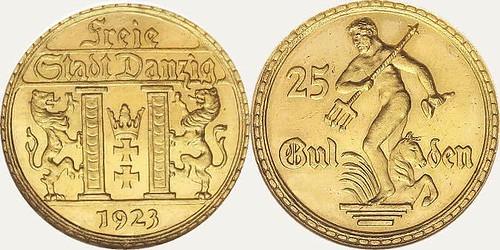
www.coinnetwork.com/photo/albums
/freie-stadt-danzig-coins

